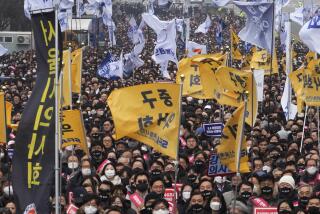China hires tens of thousands of North Korea guest workers
SEOUL — China is quietly inviting tens of thousands of North Korean guest workers into the country in a deal that will provide a cash infusion to help prop up a teetering regime with little more to export than the drudgery of a desperately poor population.
The deal, which has not been publicly announced by either Beijing or Pyongyang, would allow about 40,000 seamstresses, technicians, mechanics, construction workers and miners to work in China on industrial training visas, businesspeople and Korea analysts say. Most of the workers’ earnings will go directly to the communist North Korean regime.
“The North Koreans can’t export weapons anymore because of [international] sanctions, so they are using their people to raise cash,” said Sohn Kyang-ju, a former South Korean intelligence official who now heads the Seoul-based NK Daily Unification Strategy Institute.
Although migrants from North Korea, as well as Vietnam, Myanmar and the Philippines, have worked illegally in China for years, it is unprecedented for Beijing to issue visas for unskilled and semi-skilled workers, several labor experts in China said. The deal, which provides workers for a region where China suffers no labor shortages, underscores how far Beijing is willing to go to support its potentially unstable protege.
Longtime leader Kim Jong Il died last year and was replaced by his son Kim Jong Un, who is in his late 20s.
“My gut feeling is that this is the beginning of a larger wave of North Korean workers coming in. It could be quite significant,” said John Park, an academic who has written widely on North Korean-Chinese relations. “It will allow the North Koreans to piggyback on China’s economic success to jump-start the economy under the new leadership.”
Over the years, North Korea has exported smaller numbers of workers to far eastern Russia, where they work in logging and mining, as well as to Libya, Bulgaria, Saudi Arabia and Angola. Hundreds of young North Korean women used to work in garment and shoe factories in the Czech Republic, but their contracts were canceled because of European human rights activists’ concern that they were virtually slave laborers.
The first North Korean workers under China’s new program arrived a few months ago in Tumen, a sleepy town hugging the North Korean border.
“They are already here,” said a Tumen-based businessman, who asked not to be quoted by name. He said he knew of 140 North Koreans who were working in an underwear factory in town.
Other workers were reported to be arriving in Dandong, a larger border city on the Yalu River, famed as the crossing point for Chinese Communist troops during the Korean War, and in Hunchun, a border town on a new road leading to the North Korean shipping port of Rason, where China is also developing port facilities.
Under the new arrangement, each North Korean worker should bring Pyongyang cash remittances of about $2,000 per year. Out of salaries of $200 to $300 per month, workers are likely to keep less than $50. Nevertheless, the jobs are considered a privilege because wages at home are well under $10 per month and food is scarce for many families, experts say.
The North Korean government “will make a very meticulous selection process. They will pick mostly people who are very loyal, with relatives in the Workers’ Party, so they can be sure they will not run away, and they will be very tightly controlled while in China,” said Kim So-yeol, a reporter with NK Daily, a specialty news service in Seoul. Workers also must be married.
Kim believes that the workers already agreed to are only the first wave and that as many as 120,000 will arrive this year.
North Korea already has a small number of workers in China at North Korean-government run restaurants where young women in traditional Korean gowns sing karaoke and grilled beef and nengmyon, a cold noodle specialty, are served. But most North Korean workers in China are illegal border crossers who do hard labor for $1 a day and bowls of rice.
The remittances from the sanctioned workers should help to make up for some of the cash flow Pyongyang has lost with the collapse of several South Korean-run projects, which had netted the regime hundreds of millions.
“Right now, the North Korean economy is practically bankrupt. In order to expand employment, they need to reform, but the leadership is unwilling. So they look overseas to earn money,” said Park Hyeong-jung, a senior research fellow at the Korea Institute for National Unification.
As for the Chinese employers, Park said, “There are no better employees than North Koreans: They are obedient, efficient and cheap.”
The labor deal has not been publicized by either government, both preternaturally secretive, especially when it comes to deals struck by their respective ruling parties. Another sensitivity is that the arrangement could be seen as violating the spirit, if not the letter, of U.N. sanctions against North Korea for its continued pursuit of nuclear weapons and long-range missiles.
The hiring of North Korean workers is not likely to be popular in China. A recent incident in which North Korean sailors hijacked three Chinese fishing boats infuriated many Chinese who believe their government is too indulgent of Pyongyang. And although many parts of China have labor shortages, the northeastern provinces don’t.
The North Koreans “will be competing directly with local youths for job opportunities,” said Zhang Lianggui, a North Korea expert at the Central Party School in Beijing.
Special correspondent Jung-yoon Choi in Seoul and Tommy Yang of The Times’ Beijing bureau contributed to this report.
More to Read
Start your day right
Sign up for Essential California for news, features and recommendations from the L.A. Times and beyond in your inbox six days a week.
You may occasionally receive promotional content from the Los Angeles Times.






